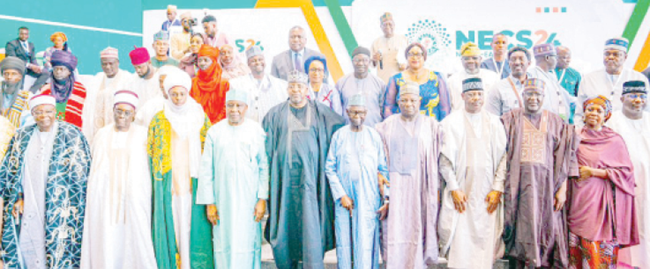Climate change is one of the biggest threats to humanity in the 21st century and is a major contributor to livelihood failures in sub-Saharan Africa. The climate crisis in Nigeria is leaving debilitating effects on the people’s livelihood and survival and the worst affected communities are those of Northeastern subregion of Nigeria.
In this area, the most pronounced impact of climate change is the exacerbation of food insecurity since the economy of this region depends solely on agriculture, accounting for up to 70% of the livelihoods. This makes the subregion a ‘vulnerability hotspot for climate variability and change impact’.

The unpredictability of weather conditions leading to drought and low farm yields have fueled the rift between farming communities and herders in search of pastures for their flock who end up destroying the farms of the local community dwellers. Also, climate change has led to forced migration from drought-affected and flood-prone communities, causing people to move to safer and more productive locations, thereby overstretching the resources in those areas and disconnecting many from their ancestral land.
It was in the effort to find a workable mitigation for the devastating effects of climate change in the North East subregion that the North-East Development Commission (NEDC) organised a two-day summit in Gombe, bringing together, experts and other relevant stakeholders to discuss the situation and fashion out areas of interventions with the theme: “Setting the course for sustained climate action in the North-East.”
The NEDC explained that the summit was organised to reiterate its commitment to mitigating effects of climate change in the North-East subregion. At the management retreat held on September 16 to 17, at the International Conference Centre, Gombe State, the board of the commission led by Major General Paul Tarfa (rtd) lamented the devastation of the subregion through years of insurgency.
According to him, “This retreat is an essential milestone for the NEDC as we come together to reflect, strategise, and set the course for the effective implementation of the North-East Stabilisation and Development Master Plan (NESDMP).”
He stressed that, “Our work here over the next two days will define not just the operational efficiency of the Commission but also the future well-being of millions of people who call this region home. As we gather, let us acknowledge the profound challenges we face: the lingering impacts of the Boko Haram insurgency, the devastating effects of climate change, and the socio-economic hardships that continue to strain the North-East.”
Paul Tarfa added that, “These challenges, though daunting are surmountable if we ingeniously harness the opportunities. Achieving the set goals in the NESDMP requires us to innovate, collaborate, and implement sustainable solutions that will transform this region. As we reflect on the strategic intent of this retreat, let us recall that the NEDC was established with a clear mandate to rebuild, stabilise, and accelerate the development of the Northeast.
“However, the success of this mission depends on our ability to work together, harness our collective expertise, and remain focused on strategic and actionable goals. I have full confidence that the leadership gathered here today has the skills and determination to turn vision into reality.”
He revealed that throughout the retreat, participants will take a deep dive into discussions that will sharpen the understanding of the regional context, address the governance structures and prioritise key initiatives.
The board chairman urged each of the participants to participate fully, bring their insights to the table, and approach these conversations with the spirit of collaboration and shared purpose stating that, “I have no doubt in my mind that the future of the Northeast depends on the outcomes of this gathering.”
He added that, “The participation of the North-East Development Commission (NEDC) at COP28 in Dubai in December 2023 is part of a concerted effort to address the multifaceted challenges facing the North East subregion.”
These challenges include: desertification and land degradation as the subregion is grappling with the encroaching Sahara Desert, leading to severe land degradation, loss of arable land, and reduced agricultural productivity posing a threat to food security and the livelihoods of rural communities.
The region also faces drought and water scarcity. Climate change has intensified the frequency and severity of droughts, resulting in water scarcity and decreased access to safe drinking water while the shrinking of Lake Chad which is a vital water source for millions of people in the region has exacerbated the situation.
There is also biodiversity loss. The North-East subregion is home to a rich diversity of flora and fauna, but climate change, coupled with other human-induced pressures such as deforestation and land-use change is threatening the region’s precious biodiversity.
Climate-induced displacement and conflicts abound in the Northeast as the impacts of climate change, including droughts, floods and resource scarcity have triggered population displacement and exacerbated existing conflicts over diminishing resources hindering sustainable development efforts.
Addressing climate change and environmental challenges requires robust institutional capacity, effective coordination among stakeholders, and a coherent policy framework.
Participants gained valuable insights and strategies to tackle these issues in the North-East as the NEDC said it is committed to fostering sustainable development in the region, guided by the pillars outlined in the North-East Stabilisation and Development Master Plan (NESDMP).
The pillars of the master plan include: Peaceful Society; Leadership in Agriculture; Healthy Citizens; Educated Populace; Flourishing Trade; Productive Entrepreneurs; Purposeful Infrastructure; Industrialisation; Memorable Experiences; Protected Environment; and Institutional Schemes, Programmes and Projects.
Specifically, the Protected Environment pillar plays a crucial role in mitigating environmental challenges and promoting climate resilience.
The Protected Environment Pillar Regional 2030 Vision envisages “a region where the diversity of life thrives, and people act to conserve nature for its own sake and its ability to fulfill our needs and enrich our lives.”
The pillar is categorised into several sectors, namely: environment, ecology, forestry, climate change mitigation and adaptation.
The NEDC said it hosted the maiden North Eastern Climate Summit (NECS 24) to serve as a platform for stakeholders to share knowledge, collaborate, and develop actionable strategies to protect the environment and build resilience against climate-related risks for the Nort-East subregion.
NECS 24 is a strategic initiative to further the mandate of NEDC, ensuring that climate change considerations are at the forefront of the implementation of the North-East Stabilisation and Development Master Plan (NESDMP).
Paul Tarfa concluded stressing that, “Let us seize this opportunity to build the foundations of a prosperous and resilient North-east.”
In his opening remarks, the Managing Director /CEO of NEDC, Mohammed Goni Alkali said that, “As we gather here today, we embark on a journey that addresses not only the immediate challenges before us but also sets the stage for long-term resilience and growth in the North-East region.”
He reminded the gathering that the NEDC was established to bring hope, stability, and development to a subregion that has endured many hardships.
According to him, “Yet, while we have made significant strides in rebuilding our communities and restoring livelihoods, the evolving climate crisis presents a new set of challenges. From desertification and water scarcity to land degradation and loss of biodiversity, the impacts of climate change are felt deeply across our communities.
“These effects, if left unchecked, threaten not only our environment but also the very foundation of our economy, security, and social well-being.”
He observed that with every challenge comes an opportunity, thus, the summit, provides a platform to forge a path toward resilience, sustainability, and long-term prosperity for the people.
According to him, “We are here to explore innovative solutions, share knowledge, and build partnerships that will ensure that the North-East not only adapts to the effects of climate change but also becomes a model of climate resilience for other regions.”
He stressed that, “Our objectives are clear: to increase awareness about the impact of our natural assets, strengthening climate resilience, identifying gaps associated with policy and governance, and most importantly, set a direction for a coordinated response to these environmental challenges.”
Goni Alkali emphasised that, “At NEDC, we remain committed to fostering sustainable development in line with the North-East Stabilisation and Development Master Plan which ensures that climate action is central to our programs. The Protected Environment pillar is a testament to our vision of creating a region where both people and nature thrive together.”
Vice President Kashim Shettima, who led the Federal Government delegation to the summit, lamented that the past few days had been tragic reminder of the realities of climate change in the country urging swift action against its devastating effects.
He said, “We have watched in grief as lives, livelihoods and communities have come under attack by climatic conditions which we don’t have control over but can have minimal effect if proactive measures are taken.
“As part of our nation, all of us must rise up to the challenge of the moment. In this context, this summit could not have come at a better time than now, we are in a more critical time, we cannot pretend that we do not see how climate change is rapidly shaping the world.”
The vice president who was represented by the Special Adviser, Special Duties to the President (Office of the Vice President), Moddibo Aliyu, said that, “The crux of the matter is that the weather is alarming. There are fluctuations of water bodies and the inability or instability of our weather conditions.”
He also stated that, “It remains clear that none of us is immune to this existential threat to our ecosystem. This is why the bold step taken by the North-East Development Commission in organising this summit signals an awakening that is long overdue.”
According to him, “Nigeria’s commitment to the global search for solutions to the devastations of climate change has never been in doubt. In Dubai last year, His Excellency, President Bola Ahmed Tinubu was there to stress Nigeria’s commitment.”
He stated that, “With gas emissions, unless every individual and institution rise up, the result is to prepare for climate change. We have placed ourselves at the forefront of global cooperation to implement solutions that can reverse the effects of climate change.
“This summit is a vital step in realising this objective. This summit is to achieve low greenhouse, gas emissions, green and sustainable road.”
He added: “There is a clear target for meeting net zero. The energy transition plan is to be achieved by 2060. Additionally, the national climate change policy and climate action swaps now transition towards a local carbon economy.”
Read Also: Edo election, victory for democracy — IPCSL







